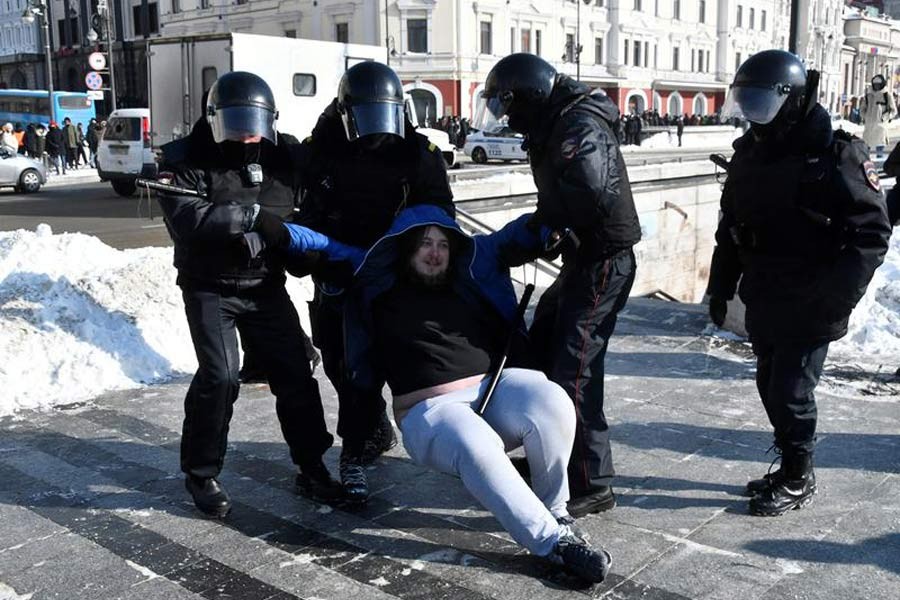Police detained more than 1,000 people and broke up rallies in Moscow and across Russia on Sunday as supporters of Kremlin critic Alexei Navalny took to the streets to protest his jailing, despite biting cold and the threat of arrest.
The nationwide rallies follow large protests last weekend that are part of a campaign to pressure the Kremlin into freeing Russian President Vladimir Putin’s most prominent opponent, reports Reuters.
The opposition politician was arrested on January 17 after returning to Moscow from Germany where he had been recovering from a nerve agent poisoning in Russia last summer. He accuses Putin of ordering his murder, which the Kremlin denies.
Police in Moscow detained at least 100 people as the rallies began under snowfall around 0900 GMT amid a huge police presence, Reuters reporters said. OVD-Info, a protest monitoring group said police had detained 1,009 people nationwide.
Yulia, a 40-year-old protester in Moscow, said she had come to the protests despite having a panic attack the night before because of worrying about repercussions for taking part.
“I understand that I live in a totally lawless state. In a police state, with no independent courts. In a country ruled by corruption. I would like to live differently,” she said.
Police have said the protests were illegal as they had not been authorised and would be broken up. Authorities have said demonstrators could spread COVID-19.
Crowds of protesters were scattered about in Moscow after the organisers twice changed the planned gathering point as police took highly unusual steps to seal off pedestrian access to areas of the capital and shut down metro stations.
Police put turnout at the Moscow protest at around 300 people.
In the far eastern city of Vladivostok, police prevented protesters from accessing the city centre, forcing them to relocate to the waterfront by the frozen Amur Bay.
Video footage showed protesters chanting “Putin is a thief” as they linked hands and marched on the ice in temperatures of around -13 Celsius (8.6 Fahrenheit). Police detained more than 100 people in the city, OVD-Info said.
In Tomsk, the Siberian city that Navalny visited before suddenly collapsing on a domestic flight last August, demonstrators gathered in front of a concert hall and chanted “Let him go!”.
Dozens turned out in the east Siberian city of Yakutsk despite temperatures of -42 C (-44 F).
“This is the first time I’ve come to a protest. I’m just fed up with the total lawlessness of the authorities,” said Ivan, a protester who declined to give his surname.
SUPPORT TEST
The protest is a test of Navalny’s support after many of his prominent allies were targeted in a crackdown this week. Several, including his brother Oleg, are under house arrest.
“If we stay quiet, then they could come for any of us tomorrow,” Yulia Navalnaya, the Kremlin critic’s wife, wrote on Instagram.
Navalny, 44, is accused of parole violations which he says are trumped up. A court is due to meet next week to consider handing him a jail term of up to three and a half years.
The West has told Moscow to let Navalny go and his allies have appealed to U.S. President Joe Biden to impose sanctions on 35 people who they say are Putin’s close allies.
Seeking to galvanise supporters at home, Navalny put out an online video this month that has been viewed over 100 million times, accusing Putin of being the ultimate owner of a sumptuous Black Sea palace. The Kremlin leader has denied this.
On the eve of the protests, Arkady Rotenberg, a businessman and Putin’s former judo sparring partner, said he owns the property.


